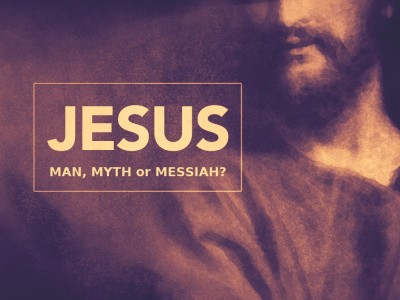
Esta entrada también está disponible en: Spanish
Jesus Shares the Deeds of God
In this series of 6 blog posts, I show that, using only historical data that critical/skeptical scholars grant, it is possible to build a cumulative case demonstrating that Jesus not only was considered God by his followers and the early church, but that he claimed to be divine and acted consistently with such claim.
In the previous post, we argued that Jesus is God because he shares the Names of God.
Now we follow along the same line, arguing that Jesus is God because he Shares the Deeds of God:
Part 5. Jesus Shares the Deeds of God
It is likely that the earliest pre-Pauline creed can be found in 1 Cor. 15:3-7. Even critical scholars like John Dominic Crossan,1 Robert Funk,2 E.P. Sanders,3 and Bart Ehrman4 agree that this material can be traced back to within 3-5 years from the crucifixion—or even earlier. In verse 1-2 Paul states that the creedal (gospel) message (3-7) has to be believed to be saved. Then in v.3 he states that the message is “of first importance.” Paul then delivers the message:
Christ died for our sins in accordance with the Scriptures, that he was buried, that he was raised on the third day in accordance with the Scriptures, and that he appeared to Cephas, then to the twelve. Then he appeared to more than five hundred brothers at one time, most of whom are still alive, though some have fallen asleep. Then he appeared to James, then to all the apostles.
The message is clear. Human salvation depends on the belief that Jesus died and was raised from the dead.5 Salvation in the Jewish context is always a work of God. It is also important to note—contrary to the belief of Pinero6 and other skeptics—that Paul was not the founder of Christianity as we know it. Paul claims in 1 Cor. 15:11 that “Whether then it was I or they, so we preach and so you believed.” Paul was not the only one preaching the same message and he was also not the originator. In fact, after his missionary journeys, Paul travels to Jerusalem to corroborate his message with the other apostles, and they give him “the right hand of fellowship”7 as a sign of approval. Not only Paul didn’t invent Christianity or the deity of Jesus but, these beliefs can be traced back to the events right after the cross.
In another “Q” passage,8 Jesus says,
“All things have been handed over to me by my Father, and no one knows the Son except the Father, and no one knows the Father except the Son and anyone to whom the Son chooses to reveal him.”
Here Jesus claims to be, not one Son but the Son. And that the knowledge of the Father is unequivocally a power exclusive to the Son. The conclusion from Jesus’ words is that this way to know God is an exclusive prerogative of Jesus. This puts Jesus in a different level from all humanity. Seen within the context of salvation, and that salvation is a work of God, establishes Jesus in a divine category.9
We already mentioned that Paul presents God and Jesus—on par—as creators of all (1 Cor. 8:6). Pinero doesn’t interact with this passage in his published work, however scholars such as Robert Grant affirm that here,
“The supreme Father resembles the supreme Zeus, while the work of the Lord Christ is like that of the various demiurgic gods…”10
To this objection, it is hard to improve on the response from Dr. Richard Bauckham:
Paul has in fact reproduced all the words of the statement about YHWH in the Shema…but Paul has rearranged the words in such a way as to produce an affirmation of both one God, the Father, and one Lord, Jesus Christ…. Paul is not adding to the one God of the Shema a “Lord” the Shema does not mention. He is identifying Jesus as the “Lord” whom the Shema affirms to be one.11
Bauckham then delves into the Greek of 1 Cor. 8:6 to show that Paul “assigns the final cause [of creation] to the Son” thus putting Jesus and YHWH at the same level of creative power.12
Jesus also spoke with authority previously unheard of. In the sermon of the mount he frequently uses the phrase “You have heard…. But I say to you.” This is equivalent to affirming “this is what Moses wrote from YHWH, but this is what I say.” Two of these passages—at least—are confirmed “Q” sources (Matt. 5:39, 44) thus we have no reason to doubt that the sermon is an authentic saying of Jesus. This is different from the formula used by prophets: “thus says the Lord” or “the word of the Lord came.” Jesus never used such formula but spoke in his own authority, “I say to you.”13 Similarly, the double use of the word “amen” by Jesus (a word of Aramaic origin אמן) often translated as “truly” or “verily” when used at the beginning of a sentence “has no precedent in the Old Testament, nor have scholars found any precedent in the rest of ancient literature.”14 We can conclude that Jesus’ self-understanding included a divine authority with no precedent in Jewish history. This understanding was also well acknowledged by Paul and Peter.15 In the very first sermon of Peter in Acts 2:4-42—on the Day of Pentecost—the apostles are filled with the Spirit, an act that Peter affirms to be the fulfillment of Joel 2:28. Peter’s logic is simple:
“What Joel’s prophecy states that God would do…Jesus did.”16
This is clear from Acts 2:32-33:
“This Jesus God raised up, and of that we all are witnesses. Being therefore exalted at the right hand of God, and having received from the Father the promise of the Holy Spirit, he has poured out this that you yourselves are seeing and hearing.”
Therefore Jesus pours the Holy Spirit as Joel prophesied God would do.
As a last bastion of evidence showing that Jesus executed the deeds of YHWH, we should note that Paul and the early church also considered Jesus the rightful judge of mankind—a task exclusively attributed to God. This is evident in passages too numerous to cover individually, and the frequent references to “the day of the Lord.”17 Let´s review a clear example:
“Why do you pass judgment on your brother? Or you, why do you despise your brother? For we will all stand before the judgment seat of God” (Rom. 14:10)
“For we must all appear before the judgment seat of Christ, so that each one may receive what is due for what he has done in the body, whether good or evil. ” (2 Cor. 5:10)
It is interesting that in 2 Cor. Paul writes that “we must all appear before the judgment seat of Christ” but in Rom. 14:10 he uses the very same language but replaces only Christ with God. It is evident that Paul is referring to the same judgment seat, therefore Jesus is God since Jesus is the executor of God’s judgment.
In the next post we will see that Jesus is God because he shares the Seat of God.
To be Continued…
- J.D Crossan & Jonathan L. Reed, Excavating Jesus: Beneath the Stones, Behind the Texts, (New York: HarperSanFrancisco, 2001), 254. ↩
- R.W Funk and the Jesus Seminar, The Acts of Jesus: What Did Jesus Really Do? (Santa Rosa, CA: Polebridge Press, 1998), 466. ↩
- E.P Sanders, The Historical Figure of Jesus (New York: Penguin Books, 1993). ↩
- Bart Ehrman, The New Testament: A Historical Introduction to the Early Christian Writings, (New York, Oxford: Oxford University Press, 2004), 282. ↩
- For a detailed argument about the early dating of this creed see chapter 1 of, Gary R. Habermas, “Evidence for the Historical Jesus: Is the Jesus of History the Christ of Faith?,” www.garyhabermas.com/evidence1, (accessed November 11, 2015). ↩
- Antonio Pinero, “Para Entender a Pablo,” Personal Blog, http://www.tendencias21.net/crist/Para-entender-a-Pablo-de-Tarso-3-01_a38.html, (accessed November 11th, 2015). My Translation. ↩
- See Galatians 2:1-10. ↩
- Matt. 11:27; Luke 10:22. ↩
- This is especially obvious after our prior analysis of the Creed in 1 Corinthians 15:1-7. In verses 1 and 2 Paul basically says: “If you believe the message of the Gospel that follows, your are saved, if not, you’ve wasted your time.” ↩
- As Quoted by Bowman, Robert M. Grant, Gods and the One God, Library of Early Christianity 1, ed. Wayne A. Meeks (Philadelphia: Westminster Press, 1986), 112. ↩
- Richard Bauckham, God Crucified: Monotheism and Christology in the New Testament (Grand Rapids: Eerdmans, 1999), 38. ↩
- Ibid., 39. ↩
- Bowman, 2414. Kindle. ↩
- Klyne R. Snodgrass, “Amen,” in Baker Encyclopedia of the Bible, ed. Walter A. Elwell (Grand Rapids: Baker, 1988), 1:69. ↩
- In Gal 2:19-20 Paul affirms that to “live” is to be “crucified with Christ”. For Paul, Jesus is the author of life. Peter spoke of Jesus in his early sermons as “the author of Life” (Acts 3:15). See also Rom 6:23; Phil. 1:21, and 2 Cor. 4:10-11). ↩
- Bowman, 2474. Kindle. ↩
- See Acts 3:30-31, 1:24; 1 Cor. 4:5, 1:8, 5:5; 2 Cor. 1:14. 5:10; Rom. 14:10-11; ↩


